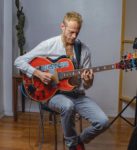
I interviewed Israeli born NYC jazz guitarist Rotem Sivan from his apartment over Skype on Sunday, Jan. 13 2019 – I found him to be a man of a surprisingly high and disciplined work ethic with a very clear vision of what he wants to do musically and where his career is going. In hearing about his road to where he is today musically, you almost can’t see how he could do anything but succeed in whatever he puts his mind to.
DP: The first thing that I always like to ask people is why they chose to play the guitar.
RS: I guess I always loved guitar, it was something I always was really, really into. I remember asking my parents to take guitar lessons. So they told me – I grew up in Jerusalem – I had these kindergarten teachers and they they used to play guitar and sing songs, and they told me that I was like really into it. I don’t really have clear memories of that, but when I was about four my grandparents got me a guitar, and they got me like a plastic guitar, and apparently I rebelled and I said “I need a real guitarâ€â€¦
DP: (laughing)
RS: …so they got me like a little wooden guitar, and I was very happy, but I didn’t really study so I guess I just messed around with it. But then a couple of years later I asked my parents all the time to study and there were like “Oh, you’re too smallâ€, and I was like “No!!!â€, so eventually I did. I just always loved it, I’m not sure why.
DP: Do you remember a particular guitar player sort of hitting you at first – or was it just the sound of the instrument?
RS: Yeah, the sound of the instrument of the instrument actually….but people like Jimi Hendrix, and certain rock bands…I remember there was this sort of 80s fusion band that someone showed me, they were called UZEB, I think…(a jazz fusion band from Montreal)….but I was really just in love with the sound of the guitar, so even things like Leonard Cohen songs that had all these melon string guitar sounds were kind of magical to me., Nick Drake, different artists…
And then I started to play and someone showed me some jazz stuff from people like Pat Metheny, Wes Montgomery, all these guys, an dI was like…..amazed!
DP: So you wanted to play jazz guitar almost right away then….
RS: Yeah! I guess I kind of played guitar and I remember playing songs with my friends and not really practicing, and then my teacher just said, “yeah, well, you got it, so I’ll show you some scales and stuffâ€, and then a friend of my brothers showed me some albums like “Live†with John Scofield with Richie Beirach, and I was like “wow!â€
DP: Yup, I had that record! (laughs)
RS: So good! And this guitar player Christian Escoude’s “Live at the Village Vanguard†– it’s super bebop all just playing standards with Hank Jones, and the vibe is so good. I learned that album really well, but at that moment I started really checking out Wes and Pat Metheny and being like “OK – the mastersâ€.

DP: So for you the main guys at first were Scofield, Pat Metheny and Wes?
RS: Pat Metheny and Wes for sure, but Scofield not so much, honestly I just liked that album. So he wasn’t a big influence but he’s amazing, you know? And then I always loved piano so I started out checking out piano players a bit later on. I got into like Bill Evans and Amal Jamal and all the guys, and then alter on Brad Meldau and more contemporary people. I always want the guitar to sound like a piano…
DP: Right, and I see that in your playing very clearly. All that stuff that you do where you devote a couple of fingers to a melodic figure on top and then have the others playing guide tone type chords accompaniment underneath shows that – there’s not too many people that do that.
RS: Thanks, yeah, so I really like how piano trios sound so I spent a lot to time transcribing like Bill Evans stuff and also listening a lot and really be in that world. That was kind of like a mission of mine, I didn’t want to play anything except playing trio (laughs).
DP: Well, you do it really well. People that don’t think about that, for me, that’s the kind of guitar trio that I’m really not that interested in listening to.
RS: Yeah, with the guitar there are so many options and with the guitar, it’s a fairly new instrument, so there’s much to explore and expand. The guitar is really just at the beginning. If you are just using a one line thing it’s a world, but there are so many more options. It’s really exciting, I am really interested to see what will happen in the next time to come.
DP: I agree, I think that the generation that you are from has done more to upgrade the vocabulary of jazz guitar than any since the fusion era.
RS: Interesting – yeah, I just….this is a bigger discussion in the sense of “what is jazz and how we define itâ€, and where is the line and all that…
DP: Speaking of that, I’ve been looking to see if there is a sub-genre name for players like you and Lage Lund, Kurt Rosenwinkle, Gilad Heckshelman, etc., like “post-post bop†or something but I’m not seeing one – do you have a name for it?
RS: Hmm, that’s interesting…not really. We did used to talk about the kind of jazz that we did with a lot of Israeli influences where we called it “Falafel Jazzâ€â€¦
DP: Hahaha- That’s great!
RS: (laughing)…so you could write a tune and then it was like “oh yeah, it’s Falafel Jazzâ€, and everybody knew what’s the vibe and what to play…
DP: Well, my partner in JGS John Pin lives in Australia, and there’s an amazing jazz guitarist there named James Muller, and they have this thing they do there called “ARCâ€, which stands for Australian Rhythm Changes…
RS: Oh really, what’s that?
DP: (laughing) That’s a good question! I haven’t totally figured it out, but it seems like maybe they go like “regular time, double time feel, double time, go into other keysâ€, but they like shift gears as they are playing or something. There’s lots of videos on YouTube you can watch to see what they are doing, but there’s a number of tunes these guy’s name with some modification “ARC†in it, so it has to be a defined “thing†(laughs) – and Scofield called him a genius…
RS: That’s cool! OK, THAT’S pretty good (laughs)
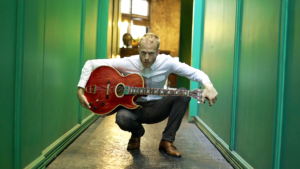
DP: So you got your first guitar at 4 and it was plastic and you demanded a wooden one, and then you started lessons around 6?
RS: No, I think it was later, I think it was like eleven.
DP: So you had a private teacher, and then did you go to music school like university, or what did you do?
RS: Yeah, I studied with him for a while and he taught me a lot of love for the guitar, but then I felt like I wasn’t progressing enough, so my parents were going like “what’s going on because you’re spending time and energyâ€, and they were really right because he was a really nice person, but he wasn’t a great teacher. So when I was like 16 I went to a school called HAIFA (university) and I took from a great teacher whose name was Oren Frank, and he pretty much took me from the beginning, because I didn’t even know what the blues form was. I knew some stuff and could do a few things, but it was all kind of unclear and not built up from the ground up.
And then I was also thinking of moving to the music department in my high school and so I started taking like solfege and harmony lessons and all these kind of things, and I got much more series in practicing and diving into music. So when I was like 16 or 16, I said “OK, I want to try to figure this outâ€. And I started having notebooks of what I was practicing and what I needed to practice and how to figure out how this whole world (of music) works. It was like the universe that I want to be a part of that I was like “outsideâ€, and I wanted to “get inâ€. I was like listening to Bach or Wes Montgomery and just went “what’s going on?â€
DP: Right, you knew that there was there was a logic to it and you needed to unlock it.
RS: Right! So I shifted to the music department but it was all classical and we have a lot of harmonic dictations and rhythm classes and different composition classes, and it was all taught by really great and well known composers like Prof. Yinam Leef. So they were the faculty and all the classes were given on piano and it really pushed me. Out of all the students about 4 or 5 had perfect pitch. One of my best friends Uval said he would get upset that there was a girl that could take (musical) dictation faster than him just because he couldn’t write as fast with a pencil as her (laughs)! You know? The level was SO HIGH, and I was like “What??â€Â
So I was like “how do you do that?â€. So I took these lessons where I recorded like hundreds of small melodic fragments to transcribe, and record all these chord colors and write dozens of pages of transcriptions, intervals, all of that stuff. And so I started to go to classical composition lessons at this university in Tel Aviv with this teacher Dr. Boccella Rubenstein – she kind of developed this whole system for perfect pitch, and really interesting ways to respond to colors and harmonic progression….
DP: So, you developed perfect pitch?
RS: Well, not really, but I would a lot of times be able to know what it it – not 100%, but it’s really helped me to respond very fast to elements of color and chords.
DP: Do you find that your pitch gets way better when tree guitar is in your hand?
RS: Yes, like I hear something and I can play it back – but again, these are elements that I have worked a LOT on. But it’s easier the more we have those melodic and harmonic elements under our fingers, so I spent lot of time trying to do that. I got really good with the classical stuff at hearing harmonic progression because I could play them on the piano, and I just went “you can do this, you can do that – OK, voice leading, and all of thatâ€, so when the teacher used to come twice a week and play us these professions, I could write them down very fast. Because I just knew what the options were, so if there was something that I didn’t know, I would just write a question mark and then when I got to the end I would say “OK, what could that be?†and figure it out. So it’s like a lot of elimination.
DP: Interesting – so it was all classical, what there a classical guitar teacher as well?
RS: At the university I was studying classical composition, but I did study classical guitar for maybe 2-3 years. But it was just for fun, I didn’t perform – well, maybe once – but just to study, to know the guitar better. It’s a world and very interesting to explore. I spent a lot of time practicing the Bach Violin Sonatas and the Cello Suites, and I remember working on the G minor huge from that book.
DP: (Sings the theme of the fugue)
RS: Exactly, oh my God! I remember like playing those triads and I couldn’t really see them on the guitar, and I said “this makes no sense, I can play them way easier on the piano, and I din’t even play piano wellâ€, so I said, “OK, let’s figure this outâ€. So I said “let’s map it outâ€, so I imagined it was the piano and I said “how would I voice lead this?†So I would always ask my piano player friends what they were working on and like Hanon and whatever was in their text books and tried to put it on the guitar that would make sense musically and not be crazy.
DP: I’ve had that Bach Sonatas and Partitas for Violin book for decades, and I use it for right hand stuff, but it totally makes you find ways to finger that stuff on the guitar, it’s one of the best things I have ever done.
RS: Totally!
DP: I noticed that in the master class you did for JGS (“Abstract Bluesâ€), you did what I call “Bach Spreadsâ€, where the third is flipped up an octave for a root-5-3 voicing. You applied that to the blues and I actually do that one as well.
RS: Yeah, totally, I took it from Bach! I remember working the cello suites and I went “Wait – he’s jut playing chords!â€
(Both laugh)
DP: Yeah, exactly!
RS: And I said “This sounds so nice, I can do this!â€, and so I found some inversions, and I said “I can play ‘All The Things You Are’ with thisâ€. It’s just fun and beautiful, and it’s so just “making sense†to hear that and see it.
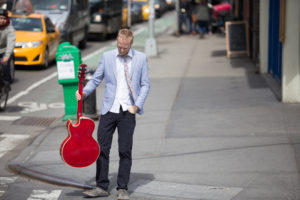
DP: Right, exactly – so did you graduate from the university?
RS: I did, yeah. I was thinking not to graduate because I really wanted to study jazz – I mean, I played jazz, but learning how to write a huge in Bach style, it took a lot of time away from jazz. It was great and I din’t regret it, but I did want to change to the Jazz Department at the New School (in New York City). So I did auditions and I got a scholarship, but I didn’t have enough money. So I was almost half way done in Tel Aviv and then I did the audition one more time, and I got a much bigger scholarship, so them I just decided to finished that school and then take the scholarship and do it (come to NYC).
DP: So then you’re off to New York – did you know anybody in New York?
RS: No, not really! (both laugh)
DP: Hah! I’ve done that twice in my life, just pull up stakes and go somewhere where you know on one!
RS: Yeah, I maybe knew one or two, but not close people. So I was just going to school and meeting people.
DP: Did you have a private guitar teacher at The New School?
RS: Yeah, the first semester I studied with Vic Juris, I had around six or nine lessons with him which was great, I mean, he’s amazing. And then after that, one of the things that’s really cool about The New School is that you can choose whoever that you really want to study with, so I just studied with a lot of people. A lot of them were really not even guitarists, like I studied with (jazz double bassist) Ben Street, (saxophonist) Joel Frahm, and (jazz drummer) Ari Hoenig…and Jonathan Kreisberg, and Rory Stewart, he’s a really great educator and guitar players and he teaches rhythm there, and he’s really super advanced and can really articulate his concepts. I’m really interested in the rhyme aspects of music, and think it’s probably the most important one. You know, you can play any bullshit line, and if the rhythm is strong enough, it will carry (laughs)…
DP: I notice that you like to use a multi-voice metronome set on lots of things other than downbeats….
RS: Yeah, when I practice I try to put the metronome on different parts of the beat, in jazz I think the sub current of the beat is really the triplet, so I think to be aware of triplets is really, really helpful. Having the metronome on the second or third triplet is definitely something I practiced for a very long time. And then of course having it on the second, third and fourth sixteenth, and have it change every four bars are a great exercise to try to internalize the time as much as possible, so when you play with people you can respond in real time to what’s going on faster and be comfortable.
DP: Have you seen (rhythm guitarist from UberJam Band) Avi Botnik’s metronome app “Time Bandit�
RS: Yes, I know Time Bandit and it’s great, I have that, but I use Metronimic more. You can set those metronomes up to do any subdivision and you can program them, it’s kind of wild – any accent you want and any volume, and dynamics – it’s crazy.
DP: Let’s talk about your guitar for a second – how long have you had that (Gibson) Howard Roberts?
RS: I think I’ve had it for six or seven years now – so I had an ES-175 from the 60s or 70s, which was great. So I took it for a re-fret and the guy that did the work – I think that (Peter) Bernstein recommended him – loaned me his guitar because I think it took a week, and his guitar was this Howard Roberts. And I know of fell in love with this guitar, because it has a little bit more sustain, it kind of felt like you were playing a grand piano verses an upright – I don’t know, for me one of the problems with guitar is that the sound is so thin – so for me thinking of all the piano trios and everything and it just felt really great, the size…and it was also inexpensive, so I sold my guitar and got this guitar for like $1800-1900.
DP: Because the Howard Roberts is just not as en vogue as the 175. I notice that you’ve got something over the sound hole – it almost looks like cork board or something – what is that?
RS: Yes, I also wanted to have something like an acoustic guitar, but I didn’t really have money to buy a good acoustic guitar, so I just said “Ah – I can just buy a microphone and put it in, and that was like $200, so I got the microphone and installed it inside the guitar…
DP: Oohhhh….
RS: But it sounded really bad so I didn’t use it, and I said, “cool, bad investmentâ€. And when I did try to use it and I turned it on, it would feed back like crazy, and I didn’t find any contact that I could use it in. Ant then I started LIKING that “bad soundâ€, so I used this to seal the sound hole to get less feedback. So this is what I did, and I have a switch now, so I can switch it on and off…
DP: I saw that switch…
RS: So there still are some issues like the battery drains really fast, but it’s still fun to work with it. I was in India for 3 months doing this teaching and playing residency and I studied some percussion, and I realized that I could just hit the guitar and it’s kind of cool. So I started to play percussion on the guitar and then when the teacher said you need to get a warmer sound, I added this pink sock to the guitar, so it just looks like this insane thing 😉
DP: I’m in a 5 guitar “little big band†called “Enormous Guitar†with just guitars, no bass and drums; and we play percussion on our guitars to accompany each other all the time. So what’s that thing that’s up on the hump on your guitar, is that your metronome thing?
RS: Oh, yeah – there are three things: One is the midi synthesizer by Korg, it’s just like sounds, just like weird sounds. And then the other two – this company called Teenage Engineering ( https://www.youtube.com/user/teenageengineering ) and they’re basically just small drum machines that you can program to do certain loops and you can play something and adjust the sounds. So what I was doing is like syncing them and then the three of them go into the mixing board as one input and then the guitar would be the second input, and then the midi pick-up would be the third input. And the I would run all of this into board and then into the loop pedal so I could loop a certain percussion element and then play on that, and then send that to my drummer, so he will have that in his headphones.
DP: So let me make sure that I understand the signal flow here: you’ve got an acoustic guitar pick-up inside the body of the Howard Roberts, you’ve got your Howard Roberts pick-up and they are going out the output jack – is there a way to blend the two?
RS: Yeah, and there is another element: there is also a piezo bridge pick up. Right now, I need to get a preamp for that to do it better, and I can’t really blend the microphone sound, I kind of switch between the microphone and the (piezo) pick-up right now. But In theory, yes, this is what I want. (laughs)
DP: So then your other modules, does that come out a separate mini-plug or something?
RS: The Midi is wireless to the laptop, and then I’m taking a cord out of the laptop to the board.
DP: There’s wireless midi now? I didn’t know that! Where have I been? So you send all of this to your drummer. What is your guitar amp?
RS: It’s a DV Mark, I’m endorsed by them ( http://www.dvmark.it/artist-detail/rotem-sivan/ ) I have both the one 12 and the two twelve for bigger gigs. I usually play with two amps to get the stereo thing.
DP: Where are you hearing all this? Is it in the floor wedge?
RS: I’m hearing it all through the amp.
DP: OK, Now I get it. I really like your sound – speaking of the thinnest of the guitar, I always describe the guitar as a “one handed piano without a sustain pedalâ€â€¦
RS: So true…(laughs)
DP…and so the hardest thing you can do on the guitar is to play a tied whole note – you’ve got a nice long sound, what are you using for effects to lengthen your notes?
RS: It’s interesting, I originally had such an ambivalent feeling about effect in general. When I moved to New York I remember telling myself that I should never playing with any effects. I also remember telling myself that “yeah, one day you might think that distortion is cool, but it’s not!â€
(Both laughing) You know? “Just remember that!â€
So for me the first thing I got was an EQ – because I was touring and sometimes I got these AWFUL amps, and I was like “wow, this amp has no reverb, it’s a BASS amp, and it sounds AWFUL!â€. So I got an EQ pedal so I just would feel a little more comfortable playing, and then I got a reverb pedal, because sometimes the amps didn’t have reverb, and I was like “this SUCKSâ€, you know?
And then I got a volume pedal because sometimes it’s nice to control your volume. I think I got the EQ and the reverb pedal around the time that I released my first album. So then I was looking for a way to sustain the note so I got a delay pedal, and I have the Boss OC-3 octave pedal – it’s on most of the time but one a very, very low setting, so it is just enhancing certain frequencies just because I want the guitar to be bigger. I’m using a little bit of compression these days – there are times that I use it, and then there’s like months where I never use it. So right now I have used it for the last two months, but before that I hadn’t used it in years. I also have the POG, the Freeze pedal, a Morley volume / was pedal, and the Boomerang looper. Right now I’m also using a BB preamp and a distortion pedal, I don’t remember what it’s called, but it’s green (laughs). It’s all on a condensed pedal board that fits in hand luggage for tours.
And you can also sync the Bomerang, and I and am doing that with this drummer friend that does a lot of really cool stuff. His name in Instagram is @ecussionist, and we are writing together and haven’t actually played out yet but we are working on some stuff together. The last time we got together, we realized that he could send out his midi clock so when I loop something, I’m looping it in sync with him – and he has also the control to turn it on and off, it’s kind of wild.
DP: I think that nowadays in a lot of jazz, it seems like no one is using any effects or technology, but they actually are, it’s just not so sonically apparent. So, describe how you moved from student to artist in New York?
RS: Well, when I was in school I was spending a lot of time practicing all of the time, but first, I needed money, so I basically had to find gigs. I literally walked to anyplace that was a coffee house or bar and tried to get these weekly gigs. So if I could do like tree of four weekly gigs a week I’d make like $400, so I could kind of survive – barely. So if I didn’t have these gigs I couldn’t do it, I’d have to leave the US or get a day job, which was also like definitely not my dream. So got a bunch of these gigs and it was a good way to meet people, because I could call them – I remember like I started playing with like (drummer /educator) Collin Stranahan or different people that I want dot meet, and I’d be like “can you do this gig?†and he was like “coolâ€.
DP: That’s one of the best ways to make music happen is get a paying gig – all of the sudden you can get almost anyone to play with you! (both laugh)
RS: Yeah! Amazing bass players and drummers like Colin Stranahan, Ziv Ravitz, Jochen Ruckert, Or Bareket, Haggai Cohen Milo, Josh Crumbly, Lukes Curtes, Matt Clohesy, Yasusshi Nakamora and many more and they would play. I met John Mair there a few times – i actually didn’t know who he was so I invited him to sit in w us. he came there every week for a few weeks so it was kinda cool hang. And maybe it’s just writing some music and rehearsing a few new songs, and then you play two or three sets, so it’s a lot of playing. So once I lost a lot of these gigs and I didn’t have money, so I said “I’ll just go and be a baristaâ€, and I found this coffee shop and I was there for like six hours and I got fired the same day.
DP: (laughing loudly) Good!
RS: Yes, I was really sad that night, but the next day I was like “I HAVE TO FIND GIGS!!â€. And it was winter and really snowing and I didn’t care, I put on the boots and went and took business cards and had a book and took notes until I got enough gigs that I could like pay rent and make it happen. So that was the beginning and then you know you meet more people and then it’s not just those gigs, and some people start to call you for gigs like that. But it still was very low key-ish, but then when I graduated at almost the beginning of 2013 I guess, I was like “OK, let’s try thisâ€. I’ll try and record an album, and I’ll try and make this happen. So there were these guys that I used to do all of these local gigs together, and I was like “do you want to record an album together?†and they were like “Of course!â€. And that’s what we did, that was the first album.
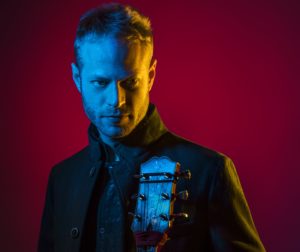
But then I didn’t know what to do with it, I had NO IDEA. So I would call any one and ask them how it works, I even would call the press and say “hey, I just recorded my first album and I don’t know how it works, would you might talking with me over the phone and just explain a little bit?â€. And a lot of people were super nice because they were like “yeah, this kid doesn’t know ANYTHING, let me just point him in the right directionâ€. So that was super helpful, and I didn’t have money for PR, so I just got some press however I could. Then I made the deal for the album on Steeplechase…
DP: Now how did you make that happen? Steeplechase is not a nothing label…
RS: I sent an email and I followed up, and it was cool and they liked the music – it was the worst deal financially, but it was cool for me because I was like “Steeplechase – yeahâ€. I knew what they did before so I was like VERY excited about it. I was also really bad in negotiating a deal, they were like “If you don’t want this, just don’t do itâ€, and I was like “no, no, I want it!†(laughs).
DP: Well, you have to do it, it’s like when you put a CD in a persons’ hand, now you’re real.
RS: I just think that it’s important to put out music regularly because it’s like snaps of how you hear reality, because it changes a lot. That’s why doing that (releasing new music) at least once a year. Right now, the last two came out under my label which is called AIMA Records. I’m working now on putting out stuff with different hip hop artists which is like a lo-fi hip hop. I think I’m going to release that in early 2019, it will be under my name on the label as well. There’s no rappers, but there is a little bit of background vocals, and I am going to give all the stems with it for free so people can mess around with them if they want to, so it’s kind of fun – it’s like instrumental hip hop, like hip hop without the singer (laughs).
DP: It seems like most of what you do is with you as a leader, is that right?
RS: Yeah, but I am producing other artists, and I don’t want to be just in the jazz world per se. There’s this artist Jack Lizard that I really love and we just did a show at the Elsewhere (Brooklyn music venue) last week, and this pop singer these we just did some work together Maria Lane. So I’m trying to prioritize that and make it happen.
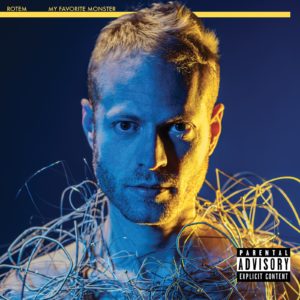
DP: Have you done much jazz side man stuff, have you gone that route much? Was that ever a goal for you?
RS: No, not really, I’ve always wanted to have my own trio. I think that I’ve played a lot of sessions with these kind of people, but I’ve never really played in their band. Maybe I should, but for me, it’s a different thing.
DP: So what’s coming up for you in the near future?
RS: So I feel like the band right now is shifting and trying to get more audience in the US, and we’ve written lyrics for all to the songs – I’m practicing singing right now, it’s a process (chuckles) . I think that this will really open up the music to a lot more people, and this is what we hear so it makes sense, and there are a lot of elements of hip hop in that sound wise and structure wise as well. There are solos and we do go for it, but there is more of a structure as well and it could be digested by people that are not in jazz. Like “OK, it has these jazzy elements but it’s a song and I can understand it’. So we’re working and doing tours in the US and I’m working and collaborating with more bands to try to do more of that.
DP: So are you looking to get booked into something like South By Southwest (SXSW)?
RS: Yeah, we’re actually doing that and will be performing there on the 12th and 13th of March.
DP: Excellent! I have to say that I’m really impressed just at your business chops, because I see so few people who understand how to make a career work, especially these days since all the rules that used to be are out the window. Do you have a booking agent, or do you book yourself?
RS: I book myself. We used to have some people in Europe, but I’ve always done a lot of work and so I book everything right now. It’s just hard, it’s a lot of work, but I really want it to happen so I’m trying. And if I don’t do a tour and I don’t do gigs, I can’t really pay rent, which is a problem (both laugh) You know what I mean? So it’s like “if this March tour isn’t happening, it’s really bad, so LET’S MAKE THIS HAPPEN!â€
DP: Well, it looks to me that you’re doing everything right…and the whole time as we’ve been doing this interview, I’ve sort of been adding up in my head what your work week must look like in terms of hours (both laugh) and I’m going, “this guy must be working 50-60 hours a week!â€.
RS: yeah, well, I gotta get stuff done! (chuckles)
DP: Well, I think that you’re going to be up there with Julian Late and all the other guys that are doing really well right now, especially with the work ethic that you have. How many years have you been playing guitar now total?
RS: Think you! Since 12 so twenty something years, but I really was only serious since 15 or 16.
DP: Well, I found you by some of the guitar duos you’ve played on YouTube, and I’m not going to name names, but in terms of the ability to surprise with your own type of melodic and harmonic ideas, I really was more impressed with you – you really have your own thing. I won’t brag about anything about myself other than I really am a great judge of talent, and you totally have it.
RS: Thank you, I know that you know a lot about the guitar so that means a lot.
For more on Rotem Sivan and all of his various musical pursuits, go to http://www.rotemsivan.com/